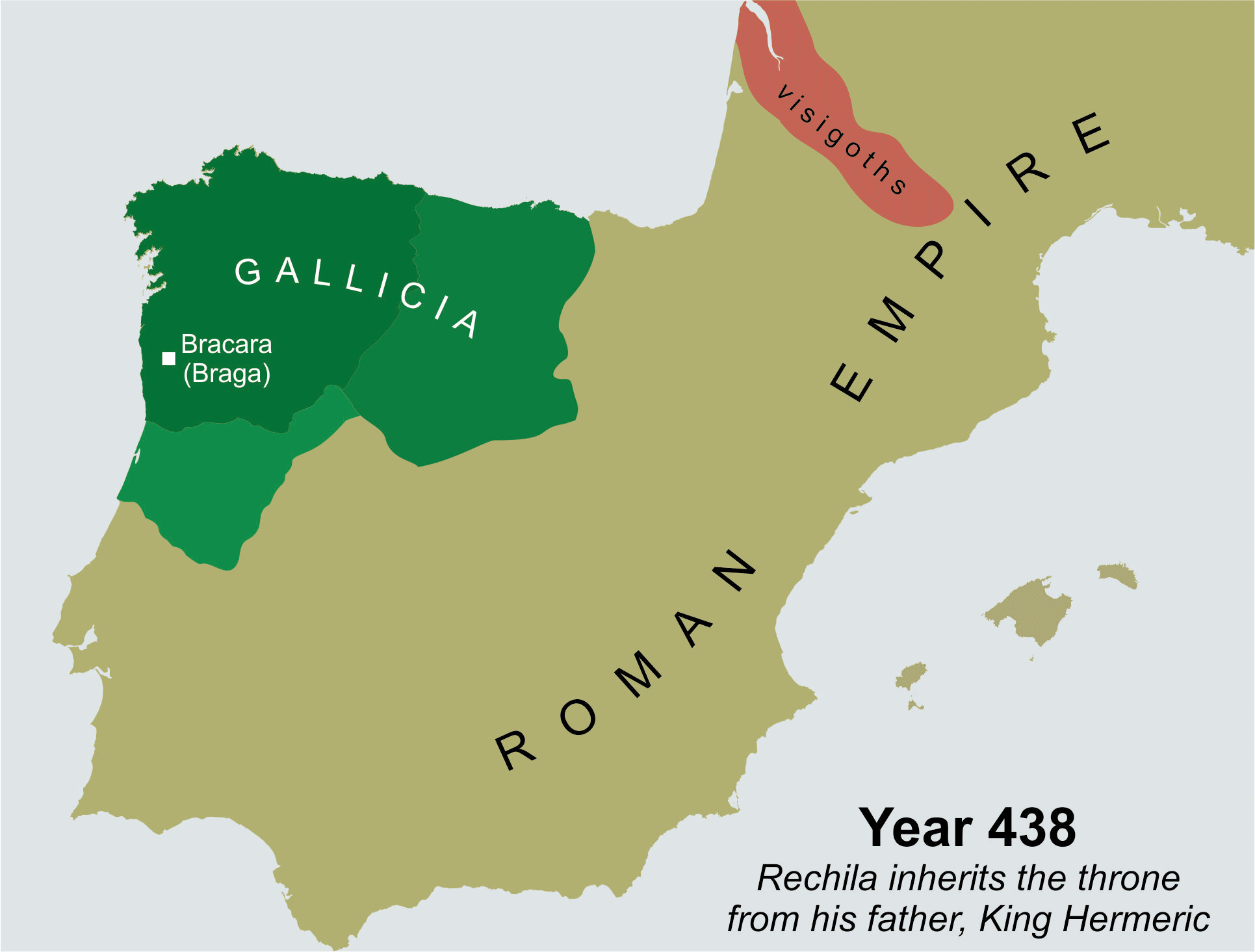Rechila on:
[Wikipedia]
[Google]
[Amazon]
 Rechila (died 448) was the Suevic king of Galicia from 438 until his death. There are few primary sources for his life, but Hydatius was a contemporary Christian (non-
Rechila (died 448) was the Suevic king of Galicia from 438 until his death. There are few primary sources for his life, but Hydatius was a contemporary Christian (non-
{{Galician monarchs 5th-century Suebian kings Germanic warriors Medieval Portugal 448 deaths Year of birth unknown
 Rechila (died 448) was the Suevic king of Galicia from 438 until his death. There are few primary sources for his life, but Hydatius was a contemporary Christian (non-
Rechila (died 448) was the Suevic king of Galicia from 438 until his death. There are few primary sources for his life, but Hydatius was a contemporary Christian (non-Arian
Arianism ( grc-x-koine, Ἀρειανισμός, ) is a Christological doctrine first attributed to Arius (), a Christian presbyter from Alexandria, Egypt. Arian theology holds that Jesus Christ is the Son of God, who was begotten by God t ...
) chronicler in Galicia.
When his father, Hermeric, turned ill in 438, he retired from active political life (dying in 441) and handed the reins of government and the royal title over to his son. He endeavoured to expand the Suevic kingdom to fill the vacuum left by the retiring Vandals and Alans
The Alans (Latin: ''Alani'') were an ancient and medieval Iranian nomadic pastoral people of the North Caucasus – generally regarded as part of the Sarmatians, and possibly related to the Massagetae. Modern historians have connected the Al ...
. In 438 he defeated Andevotus, the ''comes Hispaniarum
''Comes'' ( ), plural ''comites'' ( ), was a Roman title or office, and the origin Latin form of the medieval and modern title "count".
Before becoming a word for various types of title or office, the word originally meant "companion", either i ...
'', on the river Genil
The Genil River is the main (left) tributary of the river Guadalquivir in Andalusia, Spain. The Roman ''Singilis'', its modern name derives from the Moorish rendering of the Roman name: ''Sinyil, Sannil'', and ''Sinnil''.
Route
The source of the ...
(Singillio). The Roman position in Iberia became so tenuous that three ''magistri utriusque militiae'' (masters of both services) were sent to the peninsula between 441 and 446.
Invading southern Iberia, Rechila took the provincial capitals of Mérida in 439 and Seville in 441. These conquests were extremely significant, but nothing of the sequence of events leading to them is known. The provinces of Lusitania
Lusitania (; ) was an ancient Iberian Roman province located where modern Portugal (south of the Douro river) and
a portion of western Spain (the present Extremadura and the province of Salamanca) lie. It was named after the Lusitani or Lus ...
, Baetica
Hispania Baetica, often abbreviated Baetica, was one of three Roman provinces in Hispania (the Iberian Peninsula). Baetica was bordered to the west by Lusitania, and to the northeast by Hispania Tarraconensis. Baetica remained one of the basic di ...
, and Carthaginiensis
Hispania ( la, Hispānia , ; nearly identically pronounced in Spanish, Portuguese, Catalan, and Italian) was the Roman name for the Iberian Peninsula and its provinces. Under the Roman Republic, Hispania was divided into two provinces: Hispa ...
were subjected to the Suevi with the exception of the Levante and the Mediterranean seaboard.
Rechila was involved in near constant war with the Romans. While returning in 440 from his third embassy to the Suevi, the Roman legate Censorius
Censorius (died 448) was a count (''comes'') of the Western Roman Empire from 432 until his death. He is mentioned in the ''Chronicle'' of Hydatius under the years 432 and 440.
In 432, 437, and 440 he was sent into Hispania as an ambassador to th ...
was captured by Rechila near Mértola
Mértola () is a municipality in southeastern Portuguese Alentejo near the Spanish border. In 2011, the population was 7,274, in an area of approximately : it is the sixth-largest municipality in Portugal. Meanwhile, it is the second-lowest populat ...
(''Myrtilis''). The king had him imprisoned for the remainder of his reign.
Rechila died a pagan in Mérida: ''gentilis moritur'' ("died a gentile") according to Hydatius, but Isidore of Seville
Isidore of Seville ( la, Isidorus Hispalensis; c. 560 – 4 April 636) was a Spanish scholar, theologian, and archbishop of Seville. He is widely regarded, in the words of 19th-century historian Montalembert, as "the last scholar of ...
, writing well over a century and a half later, and whose source was Hydatius, says ''ut ferunt, gentilitatis vitam finivit'' ("finished his life a gentile, so they say"). There is no reason, however, for accepting Isidore's doubts, which were probably precipitated by the fact that Rechila's son and successor was the Catholic Rechiar. Some scholars have raised the contention that his father raised him that way in order to foster good relations with the Church and bring about the easy conversion of the Suevi.Thompson, "The Conversion of the Spanish Suevi", 79, who denies this.
Rechila may have been the father or perhaps uncle of the '' magister militum'' Ricimer.Gillett, "The Birth of Ricimer".
Notes
Sources
* Gillett, Andrew. "The Birth of Ricimer." ''Historia: Zeitschrift für Alte Geschichte'' 44, 3 (1995): 380–84. * Thompson, E. A. "The Conversion of the Spanish Suevi to Catholicism." Edward James, ed., ''Visigothic Spain: New Approaches''. Oxford: Oxford University Press, 1980. . * Thompson, E. A. ''Romans and Barbarians: The Decline of the Western Empire''. Madison: University of Wisconsin Press, 1982. .{{Galician monarchs 5th-century Suebian kings Germanic warriors Medieval Portugal 448 deaths Year of birth unknown